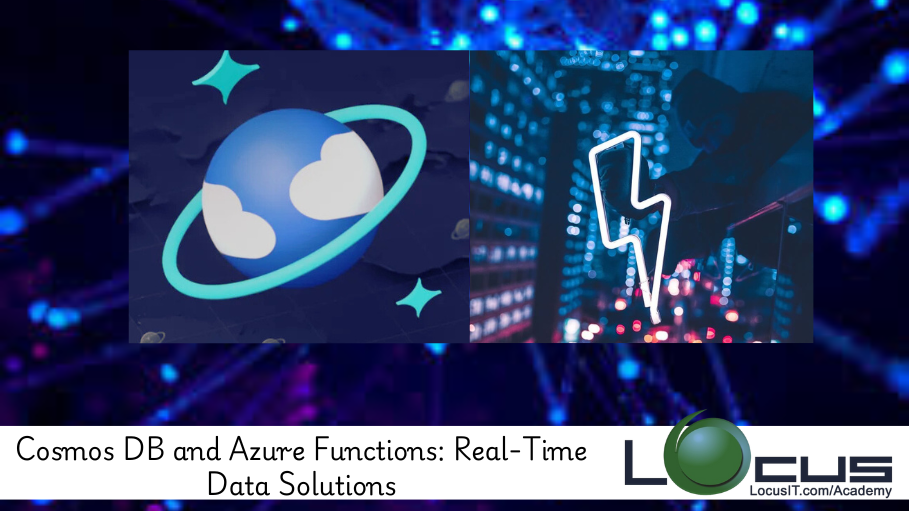Description
Introduction of Cosmos DB &Azure Functions
This course explores how to integrate this to build real-time data solutions. Participants will learn how to use Cosmos DB as the backend data store while leveraging Azure Functions to process and react to events in real-time. The course covers setting up event-driven architectures, working with triggers, and managing scalable solutions for real-time data processing.
Prerequisites
- Basic Knowledge of Azure: Familiarity with Azure services like Cosmos DB and Azure Functions.
- Experience with .NET or JavaScript: Basic programming knowledge in C#, JavaScript, or other relevant languages used with Azure Functions.
- Understanding of NoSQL Databases: Basic knowledge of Cosmos DB or NoSQL databases.
- Familiarity with Event-Driven Architectures: Experience with event-driven or microservices architectures is beneficial.
Table of Contents
1. Introduction to Cosmos DB and Azure Functions
1.1. What is Cosmos DB?
1.2. Overview of Azure Functions and Event-Driven Architecture
1.3. Benefits of Combining Cosmos DB and Azure Functions
1.4. Key Concepts: Triggers, Bindings, and Real-Time Processing
2. Setting Up Cosmos DB for Real-Time Data
2.1. Creating a Cosmos DB Account on Azure
2.2. Configuring Containers and Partitioning Strategies
2.3. Inserting Real-Time Data into Cosmos DB
2.4. Setting Up Data Models for Event-Driven Use Cases
3. Getting Started with Azure Functions
3.1. Introduction to Azure Functions and Serverless Computing
3.2. Creating and Deploying Your First Azure Function
3.3. Using Azure Functions with HTTP Triggers
3.4. Understanding Function Bindings for Cosmos DB Integration
4. Integration
4.1. Setting Up
4.2. Configuring Cosmos DB Input and Output Bindings in Azure Functions
4.3. Using Triggers to Respond to Data Changes in Real-Time
4.4. Processing its Data
5. Building Real-Time Data Solutions
5.1. Using Azure Functions to React to Cosmos DB Changes
5.2. Real-Time Event Processing: Inserting, Updating, and Deleting Data
5.3. Real-Time Analytics
5.4. Handling High-Volume Real-Time Data Streams
6. Scaling and Performance Optimization
6.1. Optimizing Cosmos DB for High-Traffic Applications
6.2. Scaling Azure Functions with Consumption Plan vs Premium Plan
6.3. Managing Request Units (RUs) and Performance Tuning for Cosmos DB
6.4. Best Practices for Scalability in Event-Driven Architectures
7. Security Best Practices
7.1. Securing Access to Cosmos DB from Azure Functions
7.2. Implementing Role-Based Access Control (RBAC) for Azure Functions
7.3. Using Managed Identity for Secure Authentication
7.4. Ensuring Data Encryption and Compliance in Real-Time Solutions
8. Advanced Techniques for Real-Time Data Solutions
8.1. Using Azure Event Grid
8.2. Implementing Real-Time Alerts and Notifications
8.3. Combining Azure Logic Apps
8.4. Event Sourcing and CQRS Patterns in Real-Time Solutions
9. Troubleshooting and Debugging
9.1. Monitoring and Diagnosing Issues with Azure Functions
9.2. Analyzing Cosmos DB Logs and Metrics(Ref: Cosmos DB Security and Compliance: Ensuring Data Integrity )
9.3. Handling Cosmos DB Throttling in Azure Functions
9.4. Debugging Common Integration Errors
10. Real-World Use Cases
10.1. Building Real-Time Dashboards
10.2. Real-Time IoT Data Processing
10.3. Event-Driven Microservices Architecture with Cosmos DB
10.4. Real-Time Fraud Detection and Monitoring
11. Conclusion
11.1. Summary of Key Concepts and Techniques for Real-Time Solutions
11.2. Next Steps: Building Scalable, Event-Driven Applications
11.3. Leveraging this for Future Real-Time Applications
11.4. Exploring Further Real-Time Azure Services
Conclusion
By the end of this course, participants will have gained the knowledge and hands-on experience required to integrate this for real-time data solutions. They will be able to design and implement event-driven architectures, optimize real-time data processing, and apply best practices to build scalable and secure applications. This combination of Cosmos DB’s NoSQL capabilities and Azure Functions’ serverless model will enable developers to create powerful, real-time applications on Azure.







Reviews
There are no reviews yet.